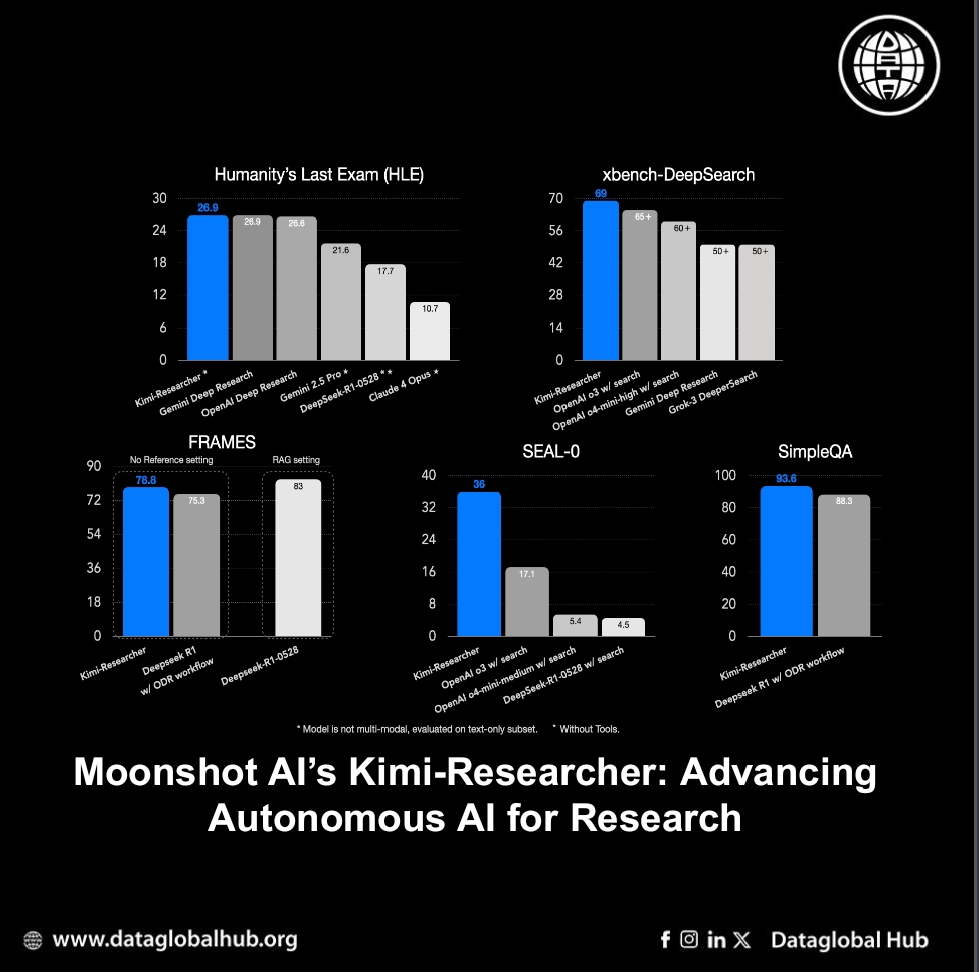
Moonshot AI’s Kimi-Researcher: Advancing Autonomous AI for Research
Translate this article
Moonshot AI introduced Kimi-Researcher, an autonomous AI agent designed to handle complex research tasks through advanced search and reasoning capabilities. Built on an internal version of Moonshot’s Kimi k-series model and trained primarily through end-to-end reinforcement learning (RL), Kimi-Researcher offers a promising approach to tackling multi-step, knowledge-intensive problems. Here’s a look at its capabilities, performance, and what it could mean for AI-driven research.
What is Kimi-Researcher?
Kimi-Researcher is an AI agent tailored for tasks requiring iterative reasoning and tool use, such as academic research, legal analysis, and obscure information retrieval. It leverages three main tools: a real-time internal search tool, a text-based browser for web interactions, and a coding tool for automated code execution. Trained using end-to-end RL, the agent learns to explore strategies, adapt to dynamic environments, and optimize solutions without relying on predefined workflows or extensive human-labeled data. This approach allows it to handle tasks holistically, integrating planning, perception, and tool use.
The agent typically performs around 23 reasoning steps and explores over 200 URLs per task, though this can vary depending on the query’s complexity. For a small set of queries, it executed over 70 search queries per trajectory, demonstrating its capacity for in-depth exploration. Its training emphasizes adaptability to changing tools and environments, making it suitable for real-world scenarios where search results or data sources may shift.
Performance Highlights
Kimi-Researcher was tested on several benchmarks, showing strong results in challenging, multi-turn tasks. On Humanity’s Last Exam (HLE), a rigorous test of reasoning and knowledge, it achieved a Pass@1 score of 26.9%, improving from an initial 8.6%, with a Pass@4 accuracy of 40.17%. On xbench-DeepSearch, a new benchmark with fewer than 200 test samples designed to align AI with professional productivity, it scored an average Pass@1 of 69% across four runs. According to referenced papers and leaderboards, this performance surpasses models like o3 with search tools. Kimi-Researcher also performed well on multi-turn search reasoning tests (FRAMES, Seal-0) and factual queries (SimpleQA).
Why End-to-End RL Matters
Traditional AI agent development often uses multi-agent workflows or imitation learning with supervised fine-tuning (SFT). These methods face challenges: workflows require frequent manual updates as models or tools change, and SFT struggles with labeling data for long-horizon tasks in dynamic settings. Kimi-Researcher’s end-to-end RL approach trains a single model to handle tasks holistically, adapting to new tools and learning from full task trajectories. Techniques like gamma-decay rewards encourage efficient solutions, while context management enables handling long-context tasks with hundreds of thousands of tokens.
Moonshot AI addressed challenges like data scarcity by creating an automated pipeline to generate diverse, tool-centric, and reasoning-intensive tasks. However, RL training faces hurdles, such as managing dynamic environments, optimizing rollout efficiency to avoid GPU under-utilization, and preventing issues like entropy collapse. The source notes ongoing efforts to improve stability and efficiency in these areas.
Infrastructure and Emerging Capabilities
To support Kimi-Researcher’s training, Moonshot AI developed a robust RL infrastructure, including asynchronous rollout systems for efficient resource use, turn-level partial rollouts to handle long tasks, and a Kubernetes-based sandbox environment for fault-tolerant operation. These features ensure scalability and stability for large-scale RL training.
During training, Kimi-Researcher showed emergent abilities, such as resolving conflicting information through hypothesis refinement and cross-validating answers for accuracy, as seen in the case studies. These capabilities highlight its potential as a reliable tool for research tasks requiring precision and adaptability.
What’s Next for Kimi-Researcher?
Kimi-Researcher is now rolling out to users, with a waitlist available on Moonshot AI’s website. The company aims to expand its capabilities toward a general-purpose agent with a broader toolkit. Plans to open-source the base pretrained model and RL-trained model in the coming months could encourage further research in autonomous AI agents.
For more details or to join the waitlist, visit Moonshot AI’s website.
About the Author

omar ali
Recent Articles
Subscribe to Newsletter
Enter your email address to register to our newsletter subscription!